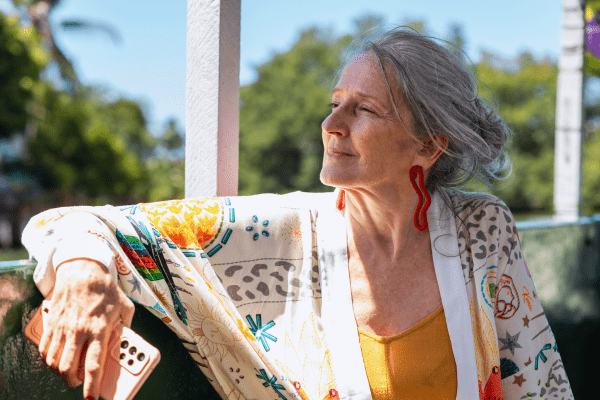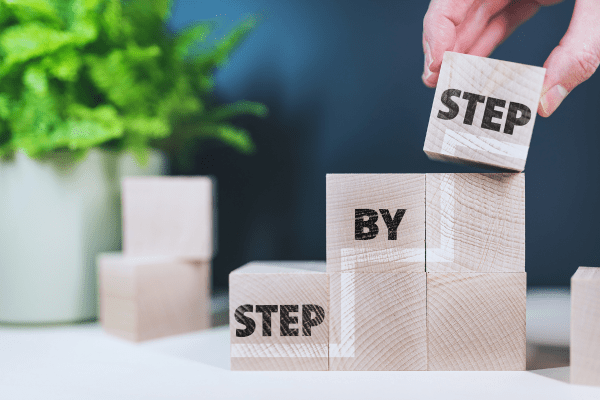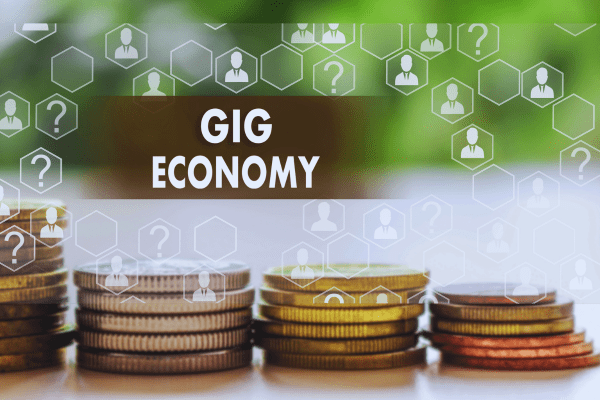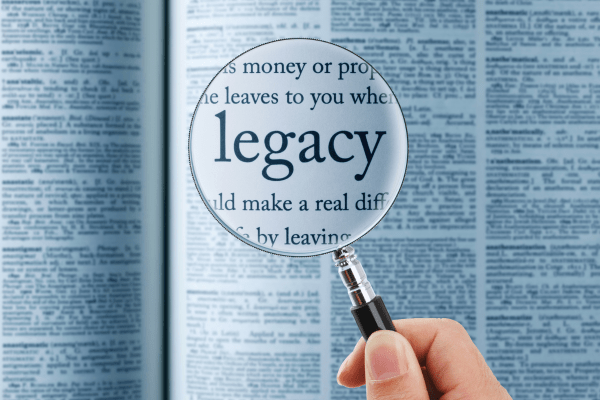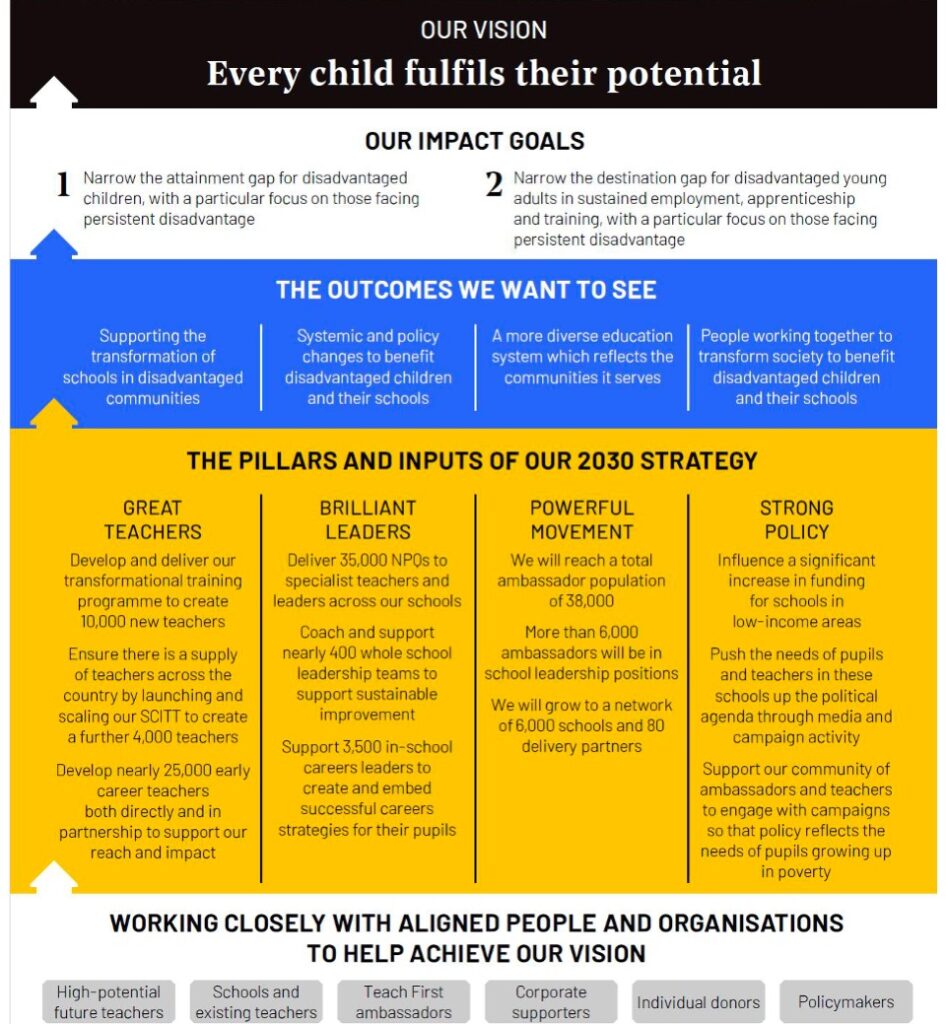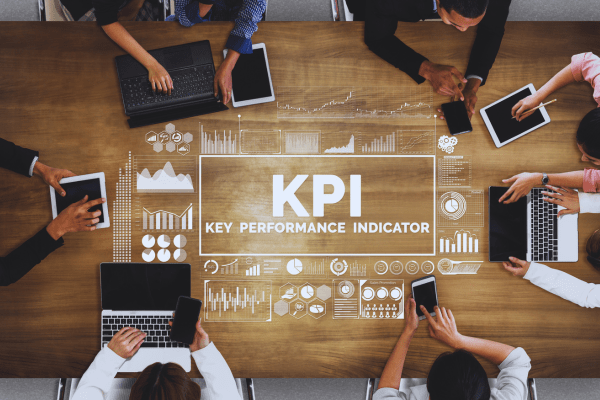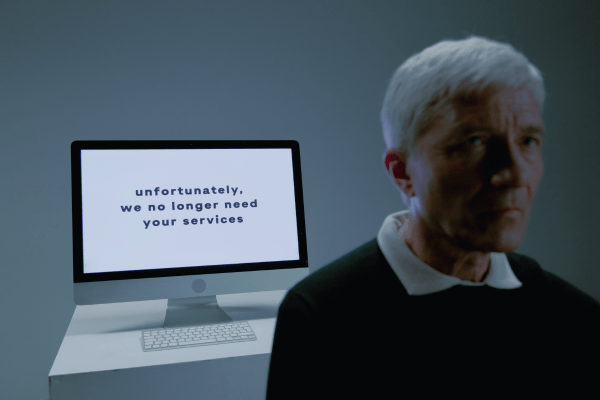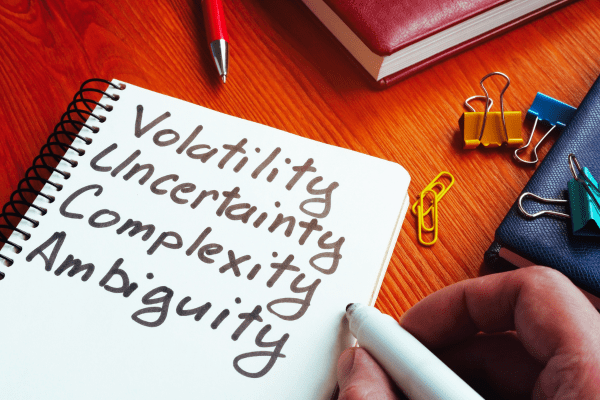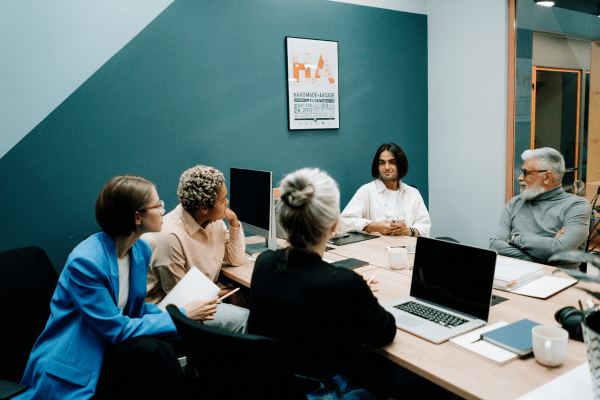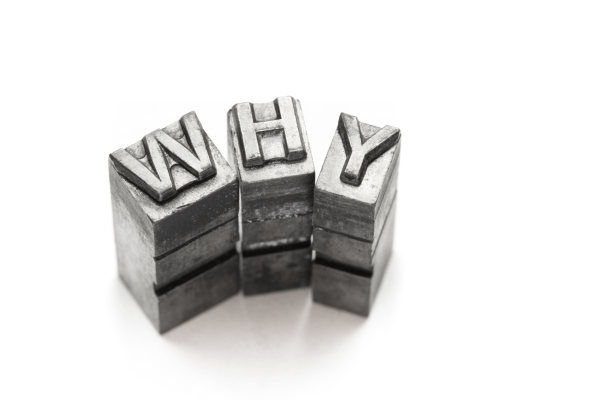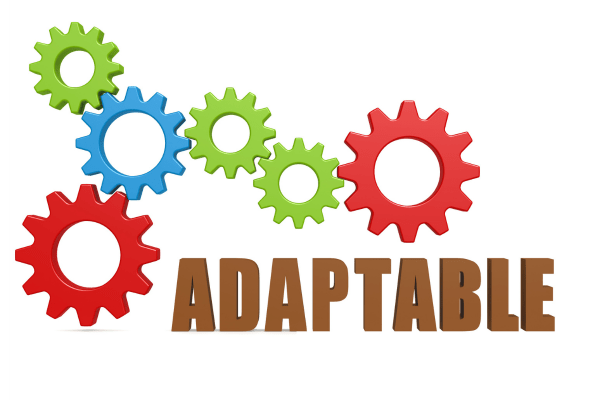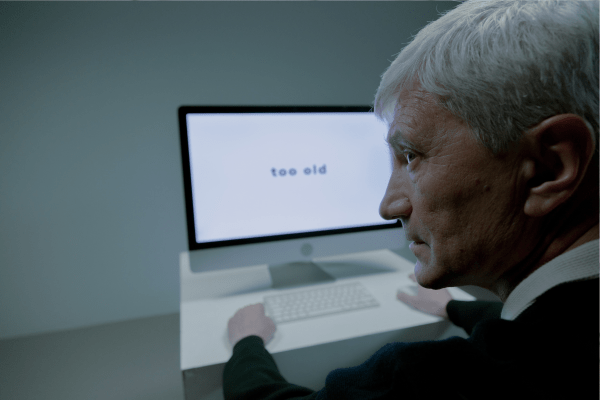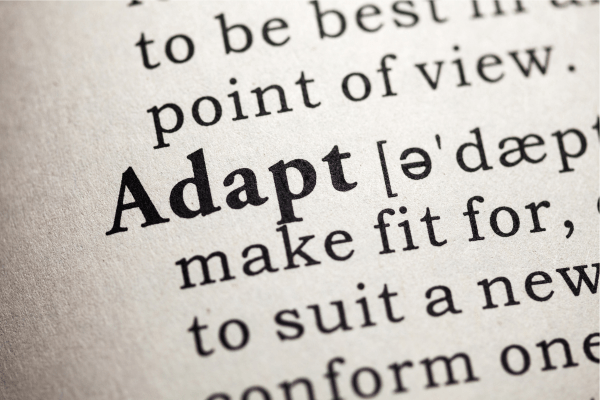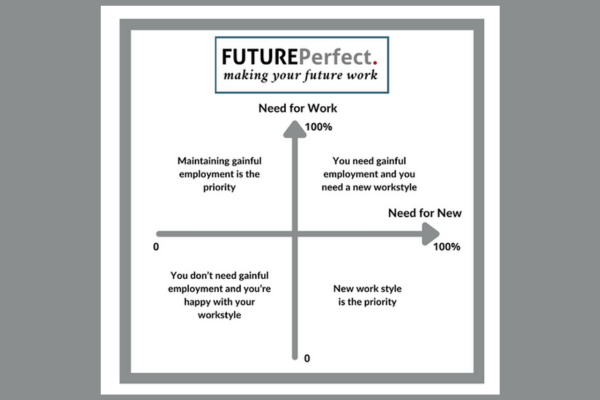Insights
As I work with Portfolio Executives in the early stages of developing their client portfolios, I encourage them to create compelling LinkedIn profiles. They should also post content regularly on LinkedIn and reconnect with their existing network.
Measurement has become something of a Holy Grail within management science. We are often told, “You cannot manage what you cannot measure.” However, measurement can be fraught with ambiguity and unintended consequences.
I was very impressed when I looked at Teach First (annual report 2022/23) and its key definitions of success.
I have noticed that if you can experience joy regardless of circumstances, you probably possess an extraordinary capacity for gratitude. Finding things you are grateful for will unlock the possibility of joy in your life.
I’m tired of 30 being the new 20, 40 being the new 30, 50 being the new 40 — all those phrases that seek to keep us locked into numbers to frame age and buy into the idea that a higher number is undesirable. So, how can you reframe your age past 48 so it feels positive?
Over the last 10 to 15 years, discussions about the gig economy have become more prevalent. The concept of individuals working on zero-hour contracts, where a platform dictates their schedule, has gained prominence. More people are using platforms to seek employment, whether in food delivery or low-value knowledge tasks like website design and transcription.
I’m not sure who coined the phrase impostor syndrome, but over the past ten years, it has become a feature of many different views about how we perceive ourselves in the workplace. This fear—that we will be discovered to be the impostors we believe ourselves to be—and the promise that all you have to do is “fake it till you make it” has become common advice.
When working for myself, I was willing to work absurd hours on absurd occasions because I felt it was all for me. But when I entered big international consulting and joined the Andersen Business Consulting organisation, I realised that they believed they owned you, in principle, every waking hour of my life.
We have explored the journeys of many senior professionals from success to significance. But what does it mean to be significant, and particularly to whom?
You may discover an alternative pathway to significance as you explore the options surrounding that question.
As the people I work with start to transition from toil, slavery, and fear to joy and freedom, they begin to cultivate their appetite for love and their capacity to love. You start to believe that you can love the work you do.
When you think of measurement of impact, particularly in the role of a Portfolio Executive and especially when seeking to influence organisational operations, you will notice that most organisations tend to concentrate heavily on activities.
I was very impressed when I looked at Teach First (annual report 2022/23) and its key definitions of success.
You may become so absorbed in an activity that you lose your sense of time and space. You focus solely on what you are doing and feel as though you can continue without interruption, effortlessly flowing with the activity indefinitely.
Over the last 10 to 15 years, discussions about the gig economy have become more prevalent. The concept of individuals working on zero-hour contracts, where a platform dictates their schedule, has gained prominence. More people are using platforms to seek employment, whether in food delivery or low-value knowledge tasks like website design and transcription.
Procrastination arises from various reasons, but often, at its core, lies the fear of taking the first step. Typically, this fear is rooted in the fear of failure. Perhaps you’ve attempted something numerous times, failing to achieve your goal each time. A classic example is trying to establish a dieting habit.
It was a famous American president who, during the Great Depression, said, “The only thing we have to fear is fear itself”.
When I speak to people about finding freedom, they often mention various fears—reasons why they can’t, mustn’t, or shouldn’t do something. However, these reasons are usually just a reflection of fear itself. So, how can you examine and assess the reality of your fears? Allow me to outline the ones I observe most frequently.
As I write this in late 2024, Joe Biden is coming to the end of his term, and people are discussing his legacy. Legacy is often a question we ask ourselves as we seek significance. But is legacy all it’s cracked up to be? For Joe Biden his legacy may be considered what’s left over after the end of his presidential term or what’s left over after he’s passed away.
In your corporate life, you may have found yourself in fantastic teams, relishing the experience immensely. It was incredibly thrilling and enjoyable. Conversely, there may have been times during your career when the individuals around you, including those to whom you reported, exhibited the most negative traits associated with corporate narcissists or psychopaths.
Once you start measuring impact, it becomes fundamental to understand what effect you want to achieve. Many organisations face the challenge of having too many different impacts to achieve.
I was very impressed when I looked at Teach First (annual report 2022/23) and its key definitions of success.
When contemplating joy, it is common to equate it with happiness. Is happiness sufficient? My concern regarding happiness is that it is too often viewed as something that can be manufactured. It is perceived as a temporary state entirely contingent upon external circumstances. We might ask, "Do you find happiness in your work?" the response could be affirmative—or perhaps not. However, happiness is frequently linked to an event, occasion, or experience.
In late 2024, I had an opportunity to review an extraordinary report prepared by Wendy Garcarz of Refirement UK. It was looking at attitudes and barriers to entrepreneurship amongst women over 55. There are a whole series of implications that, I think, extend more widely to women in general and people over 55.
In a VUCA (Volatile, Uncertain, Complex, Ambiguous) world, we are constantly faced with ambiguity. But what does ambiguity mean for us as portfolio executives and the organisations we serve?
As humans, we have extremely powerful imaginations. Our imaginations allow us to build things in our minds before we create them with our hands. We envision, plan, strategize, and execute. For example, a chess player uses their imagination to consider all the different moves that could arise from a given position. Our imagination is a potent tool but can also be a source of fear.
It may not be the most attractive metaphor, but I often talk to people about living in a gilded cage or being held in golden handcuffs.
When we start our working lives, our culture encourages us to aspire to success. We are driven to set goals for progress and define success according to cultural norms or the context in which we are raised. Often, this leads to a relentless pursuit of success.
As part of my commitment to supporting people in finding more freedom and joy in their work and moving away from the slavery and toil many have experienced in their corporate lives, I constantly encourage them to look at their choices through the lens of love.
Impact, outcomes, activity, SMART goals, KPIs, and OKRs—this smorgasbord of management jargon too often belies the reality that activity is not enough.
How do you ensure that activity delivers the impact you aspire to?
One of the most potent barriers to finding joy in our work is the amount of toil we endure.
What do I mean by toil? In any work, there are tasks you simply must do because they make everything else possible. But too often, as senior professionals, you can spend more time on tasks well below your pay grade. This contradicts the values you aspire to and fails to reflect your hard-won skills, knowledge, and experience.
Interestingly, a report from the Women and Equalities Committee recommended the creation of a Commissioner for Older People and Ageing in England. Yet, we still don’t have one (as of December 2024). Age UK and the Centre for Ageing Better have made multiple submissions to the Committee, repeatedly emphasising the need for a Commissioner for Older People and Ageing in England. They argued that such a commissioner should have the power to conduct class investigations into any particular abuses that came to light, report them, and then ensure their recommendations are taken up.
The ‘C’ of VUCA is complexity. Complexity arises from multiple moving parts. The traditional approach separates each part and develops an understanding of its behaviour before addressing the whole system. But other things start to emerge in a world of complexity.
There are two elements to this: What does it mean for you? What does it mean in the context of the organisation you’re seeking to operate in?
It would be great if there were a ready-made community that you could join. However, this opportunity is not always available. So, how do you start a community?
As a Portfolio Executive, I recommend that you become very sophisticated about narrowing down the initial niche in which you work. Consider what is your best niche based on the company life stage, headcount, geography, and sector. As you build your expertise in a niche, you can get recognition from your niche as the go-to person around a particular narrow segment.
It might seem futile to believe you can prevent crises. However, there are a whole series of well-understood techniques that can prevent crises. Ironically, one of the most powerful techniques to avoid crises is having a crisis management plan and a clear set of procedures used if something becomes acknowledged as a crisis.
Pillar Five is to consider introducing paid or extended unpaid carers’ leave and a full right to flexible working from day one.
This feels like a double-edged sword to me. We know that the 50 to 64-year-old age group already provides more caring than any other age group. We recognise increased pressure for carers to require leave both as parents and for parents.
In a VUCA world, we are faced with extraordinary uncertainty. If you are going to be the trusted advisor to the CEO and build the most powerful capability you can for the clients you serve, then uncertainty has to be part of your recognition of the world in which you operate.
There are two elements to this: What does it mean for you? What does it mean in the context of the organisation you’re seeking to operate in?
Community doesn’t just happen; it’s not the same as a network. Nurturing a community requires intentionally finding opportunities for groups to come together. Whether online, through specific social media platforms, or in person, the value of one-to-one contact cannot be overstated.
In retrospect, too often, we can see that a potential crisis has been building over an extended period. The warning signs were there; the rats started fleeing the sinking ship. The smouldering had been noticed. The red flags had been raised. Whatever metaphor you want to use, few crises come out of nowhere. Avoiding a situation is often about seeing trends and identifying that there will be a crisis if you continue in the direction you expect.
The Centre for Ageing Better employment commitment is not just a desire; it has articulated six distinctive elements to bring this commitment to life.
While the new government (2024) is pursuing a growth agenda, it must be hoped that they will recognise that implementing these commitments will increase GDP by £9bn per year and increase income tax/national insurance contributions of £1.9bn per year (on conservative assumptions based on tax rates Sept-24).
In Part One, we outlined the VUCA framework, its context, and how to respond. This article will examine what it means to be a Portfolio Executive working with smaller organisations in a volatile world.
There are two elements to this: What does it mean for you? What does it mean in the context of the organisation you’re seeking to operate in?
As you enter the second half of your working life, you may naturally transition from seeking success to seeking significance. In that context, finding a community of purpose can be a powerful way to build relationships with others who desire to deliver a similar purpose, creating a sense of belonging and value.
This might feel counterintuitive—why do you need your peers to recognise you? Why do you need to be more established within the professional group that you’re working in? There are several good reasons why you need recognition from your peers.
One of the critical things that bedevils crisis response is denial. You can refuse to confront the unpalatable truth of the circumstances and act as though this is not a crisis.
At one level, these terms—fractional Director, Fractional Executive, Fractional Leader and Portfolio Executive—could be seen as interchangeable. Still, with the rising popularity of fractional, I am keen to preserve the term Portfolio Executive as different from a Fractional Executive.
During the general election campaign of June 2024, the Centre for Ageing Better set out a framework for the 50+ employment commitment. Simply, they were calling on all parties to drive up the employment rate of people in their 50s, 60s and beyond, including ensuring that the employment rate for people aged 50 to 64 should rise above 75% by 2030.
For those who haven't heard of VUCA, it is a military doctrine developed after the Second World War when people recognised that conventional warfare wouldn’t be the only way to respond to military threats. They realised that the world was Volatile (V), Uncertain (U), Complex (C) and Ambiguous (A).
When you step out as Portfolio Executives, you risk becoming isolated. Often, you are recommended to go out and ‘do networking’. Networking is a valuable business development activity, but I believe there is a much richer way of thinking about what we need.
Many of the Portfolio Executives and Fractional Directors I work with have a level of personal humility that means you take it for granted that you’re doing a good job and don’t crave explicit recognition. However, as you build and develop your portfolio and want to create long-term sustainable relationships, you must get explicit recognition from your clients. How do you go about this?
I attended a fascinating workshop delivered by an individual who had been working in a crisis service built up from scratch over many, many years. He and his group of volunteers based themselves at the notorious UK suicide spot, Beachy Head.
I’m encountering two types of individuals keen to develop a Portfolio Executive workstyle that involves engaging Middle Eastern or Asian clients.
The other aspect of business development is growing and strengthening your value to current and potential clients. Here, I think there are four crucial areas that you need to consider.
There is so much in the media about how young people are not what they used to be. How young people are seen as flaky. How young people are seen as without ambition. How young people are seen as presenting a whole range of mental health issues. How young people are addicted to social media and destructive behaviour. Categorising young people with these negative connotations is ageist because it's creating stereotypes.
As a Portfolio Executive, North America can be a very attractive market. The exchange rate is very favourable (June 2024) and the fee rates that people are commanding for Portfolio Executive work in North America are generally higher than we can easily achieve in the UK.
The answer to this question will vary enormously but I think for many of us, when you've been in full time, permanent employment in very demanding roles for an extended period, you just don't know what you want to do with your spare time - you've never had any!
As people living in Britain, we often underestimate the influence that the Commonwealth has in setting the agenda internationally.
If you have a portfolio executive offer that has some success in the UK and you're now thinking to develop a European presence, then it can be a great way to extend what you're doing. But recognise some of the barriers to going beyond your existing client base in the UK and consider what tactics you want to use and the trade-offs you are prepared to accept.
One of the great things about your portfolio executive workstyle is, if you set it up correctly, it can be a really powerful platform for having different experiences of holidays and travel.
There's been lots of talk about Millennials and Boomers and Generation Z but the most encouraging phrase that I've heard that characterises an age group is Perennials.
As you build your portfolio executive client base you may, from day one, want to be international. There are a number of people that I've worked with where, because of their existing relationships, when they step into a portfolio executive work style it makes sense for them to start with an international perspective.
For many of us, when we have been in full time permanent employment, often in demanding roles for an extended period of time, we just don't know what we want to do with our spare time – we have never had any!
We have seen for centuries how women have been discriminated against because when they become available to have children, employers have seen them as ‘at risk of pregnancy’. When they take time out to bring up their children, their future careers are constrained.
As your portfolio matures, there are opportunities to add additional elements to your offer and use that to increase your effective fee rate. So, if your primary offer as a portfolio executive is part-time responsibility for a function in a smaller organisation then that's great, but now consider these other two offers that you can add to the picture.
As a portfolio executive, fee earning is clearly the core and the priority of everything you do, but alongside fee earning, I do believe you need to spend some time in what I would call business development or practice development..
I was intrigued by an article in The Guardian, in November 2023, where they were talking about how work has conquered every day of the week and how do we remain human in a world that worships toil? This is a particular challenge as we get older, when we recognise that our capacity to provide the same level of activity and, our desire to provide the same level of activity, can be significantly diminished.
It's really interesting to see how as your portfolio matures, there are opportunities to add additional elements to your offer and use that to increase your effective fee rate. So, if your primary offer as a portfolio executive is part-time responsibility for a function in a smaller organisation then that's great, but now consider these other offers that you can add to the picture.
I think there's a very big difference between the pleasure from an activity and the sense of achievement. So, what is rewarding after 70 for me comes most closely to understanding what will feel like success? What will feel like achievement?
Just to imagine that you are confronted with these positive and negatives views of people in the workplace. I invite you to go through this list and answer this question, “which relate to younger people which relate to older people”?
Let’s imagine you've got the stage where you've got two or three clients. You've got a basic Portfolio Executive workstyle, but you want to scale this. Of course, it would be nice to have another couple of clients to move to four or five, maybe even six. It would be attractive to perhaps be a little bit busier with some of your existing clients. But my advice to people at this stage, when they're trying to scale their Portfolio Executive business is to focus on pitching at a higher fee rate for your next client.
I remember a very, very experienced professional who'd had some big corporate jobs and as he got older and more elderly, I would meet with him regularly. He told me that now, as he moved into his mid-seventies, all he believe he should do was watch and pray. To acknowledge this, he had a lapel badge with a heron. This is a bird that stands very still watching and then goes in and makes a brief intervention to catch a fish.
From the research that The World Health Organization (WHO) Global Report on Ageism drew upon, there is a very useful catalogue of different stereotypes, based upon different institutional settings that are represented across different countries.
Let’s imagine you've got the stage where you've got two or three clients. You've got a basic Portfolio Executive workstyle, but you want to scale this. Of course, it would be nice to have another couple of clients to move to four or five, maybe even six. It would be attractive to perhaps be a little bit busier with some of your existing clients. But my advice to people at this stage, when they're trying to scale their Portfolio Executive business is to focus on pitching at a higher fee rate for your next client.
It is well worth considering the options that you will have around the location if you want to enjoy your work after 70. It may be that what suits you best is to work from home, to have a minimal amount of travel and then find the clients that will respond to that.
We can get caught up in moving forward with our Portfolio Executive workstyle and lose sight of what we're really trying to achieve. We can lose sight of why we are motivated to do this in the first place.
That's what I mean by back to basics.
If you have been following the different things that we have been talking about over the previous weeks and months, you will understand that I'm passionate about people having a working life that makes the most of everything they were created to be and enables that working life to support the wider lifestyle that they want now and in the future.
I recently came across a report, developed by the World Health Organization (WHO) : The Global Report on Ageism in 2021.
One of the things that is interesting in this report is how they see the definition of ageism.
I remember a very, very experienced professional who'd had some big corporate jobs and as he got older and more elderly, I would meet with him regularly. He told me that now, as he moved into his mid-seventies, all he believe he should do was watch and pray. To acknowledge this, he had a lapel badge with a heron. This is a bird that stands very still watching and then goes in and makes a brief intervention to catch a fish.
In the first article we looked at the cycle of the financial year and the cycle of the school year to explore how much this impacted the way your clients and their customers respond to sales and marketing activities.
In this article we will look at two longer running seasons: the economic cycle and the season of your life.
Lots of people like the idea of some kind of side hustle, but what does that really mean? What are the choices you face?
As I work with Portfolio Executives, there are two things that become increasingly important. One is to help them to have a distinctive point of view about the world in which they inhabit and the second thing is for them to develop a stronger sense of personal purpose about what they're trying to do through their work. One of the very powerful ways to start to articulate this and bring it into focus, is to develop a document that I call a manifesto.
Within the AQai model of adaptability, Environment is a critical dimension reflecting the impact of company, team and the experience of individuals at work.
As city dwellers, too often we lose track of the seasons. For many of us we step out of one climate-controlled environment into another, home to car/bus/underground to office to gym or home to shopping centre, restaurant or cinema. There are no seasonal foods any more with everything available anywhere anytime. We are insulated from the rich experience of spring, summer, autumn, winter.
It is incredibly valuable as a senior professional to get experience as a board member. There are three reasons that this really can make a difference to your career.
When the Work and Pensions Secretary Mel Stride, in August 2023, suggested that older workers consider work in the ‘gig economy’, such as being a Deliveroo rider, it was immediately controversial.
Within the AQai adaptability framework there is a substantial domain called Character. You may be familiar with conventional psychometric tests: these rest upon the assumption that your psychological preferences are intrinsic and fixed for all time.
I was struck by the pejorative attitude with which so many commentators in the entrepreneurial world refer to a lifestyle business. Somehow the suggestion is you’re not a real entrepreneur if you’re running a lifestyle business. Somehow you haven’t got what it takes. You haven’t got the ambition. You will not be successful if you have a lifestyle business.
There are many situations in our lives where we start to realise that full-time employment is just not working for us. It may be that we are coming into a season where we want to look after our families, we want to have children, we want to spend time with our children.
What is the ‘Capability Attitude’ and why is it about ‘Build not Fix’? For senior professionals, whether as employees, interims or consultants, they are indoctrinated with the mantra: ‘don’t just bring me problems; bring me solutions’.
With the recent excitement around ChatGPT and Google's response with Bard, Artificial intelligence is on the agenda as never before. With the Goldman Sachs report highlighting the threats to employment for certain classes of workers, it has become something that is central to people's perception of how our working lives are going to change.
When I am working with you to help you think about your future, there are two crucial dimensions that I encourage you to examine. One is ‘need to work’ and the other is ‘need for new’. Let's start with the ‘need to work’ dimension.
The AQai model has three strands or domains.
Things you can learn to get better at; things that reflect your response to the challenges of adaptability; things that relate to the environment within which you operate
The way that you engage your first client is going to set the template for success in the future.
As you get more senior in your career, increasingly what people are going to value is less of what you do. Now what matters is what you have learned, what you known, the different range of experiences you have got and the skills you've developed. Skills, knowledge and experience are the future for you as you become more senior.
There are number of ways in which you can maximize your learning and development.
In an earlier article I talked about how the media has so much impact on the way we see ourselves. It is interesting how a current campaign of the Centre for Ageing Better is calling out many of the things that the media do by default.
Within the AQAI framework one dimension is Character. Character is a way that you can understand how people are motivated best in the context of change. In this article we are going to look at what the Character of Thinking Style means and how it can affect your organisation.
When I work with Portfolio Executives, at the beginning of our relationship the most crucial thing is to get really clear about the niche that you can use to present yourself to the world.
When you join a new employer, they haven't hired you just for what you can do today, they have also hired you with a view of the potential you have to contribute to the business in the future. To create the very best in environment in order to thrive, you need to start to plan your promotion from Day One.
Wales is the first country in the UK to appoint an older people's commissioner for Wales. We've had Children Commissioners for a long time and the Welsh commissioner has been in post for a number of years now. She has stated four key objectives as her commissioner priorities.
Within the AQai framework there is a dimension called Ability. Ability assesses the skills that you can develop to be more effective in your adaptability and one of those key skills is Unlearn. Unlearn may feel a very strange term. Let's explain what Unlearn really means
You need to establish your credibility and visibility and start initial conversations with a small number of potential clients. You need to be able to take control of the buying process and find the clients you want to work with.
When I have been working with young people who perhaps are not as familiar as they could be with what it means to be an employee, I say to them, you've got two jobs here. One is to get the task done that I ask you to get done, that I need to get done. And the second thing is to be a great employee.
As I write this, in March 2023, we have just had the most recent iteration of the Oscars and there has been some backslapping, I would say, about the fact that an older woman has won an Oscar. It is very interesting to see the way that awareness of promoting older women has grown within the acting community. Coincidentally, I listened this morning to Desert Island Discs, the Michael Caine celebration, where he was talking about his life and his continuing role as an actor into his late eighties, early nineties.



